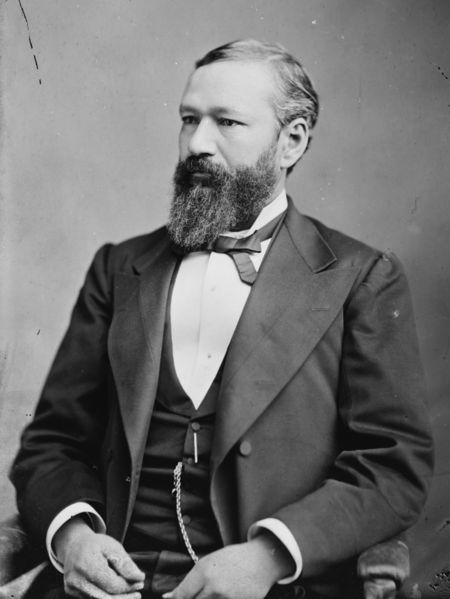“So take me away, I don’t mind… But you’d better promise me, I be back in time.”
books, business and economy, dining and cuisine, education, event, everyday glory, family and friends, food for thought, health, history, movies and TV, music, science and technology, space, style and fashion, the world, travel February 16th, 2012It’s not only NBN Thursday, but it’s also “Technical Friday.”
Last night, SaraRules! and I had Pasta & Movie Date Night. We co-cooked dinner (grilled chicken and broccoli over spaghetti, with alfredo sauce) and watched Source Code. I enojyed it… for the most part. In fact, I think the thing that I disliked the most was that the blu-ray disc started skipping in the middle of Chapter 11, making us miss roughly five minutes of the film.
*shakes fist*
Aside from that, it was a good movie. It remined me of Seven Days, with a hint of Groundhog Day.
Chew on This: Food for Thought – Black History Month
Today’s person of note is: P.B.S. Pinchback, the first non-white and first person of African American descent to become governor of a U.S. state.
Pinckney Benton Stewart Pinchback (May 10, 1837 – December 21, 1921) was born in Macon, Georgia, to Eliza Stewart, a former slave, and William Pinchback, her former master, who were living together as husband and wife. Pinchback was brought up in relatively affluent surroundings. He was raised as white and his parents sent him north to Cincinnati, Ohio, to attend school. In 1848, however, Pinchback’s father died. William Pinchback’s relatives disinherited his mulatto wife and children and claimed his property in Mississippi. Fearful that the northern Pinchbacks might also try to claim her five children as slaves, Pinchback’s mother fled with them to Cincinnati.
In 1860 Pinchback married Nina Hawthorne of Memphis, Tennessee. The Civil War began the following year, and Pinchback decided to fight on the side of the Union. In 1862 he furtively made his way into New Orleans, which had just been captured by the Union Army. He raised several companies for the Union’s all black 1st Louisiana Native Guards Regiment. Commissioned a captain, he was one of the Union Army’s few commissioned officers of African American ancestry. He became Company Commander of Company A, 2nd Louisiana Regiment Native Guard Infantry (later reformed as the 74th US Colored Infantry Regiment). Passed over twice for promotion and tired of the prejudice he encountered from white officers, Pinchback resigned his commission in 1863.
At the war’s end, he and his wife moved to Alabama, to test their freedom as full citizens. Racial tensions there during Reconstruction were reaching shocking levels of violence, however, he brought his family back to New Orleans and became active in the Republican Party, participating in Reconstruction state conventions. In 1868, he organized the Fourth Ward Republican Club in New Orleans. That same year, he was elected as a State Senator, where he became senate president pro tempore of a Legislature that included 42 representatives of African American descent (half of the chamber, and seven of 36 seats in the Senate). In 1871 he became acting lieutenant governor upon the death of Oscar Dunn, the first elected African-American lieutenant governor of a U.S. state.
In 1872, the incumbent Republican governor, Henry Clay Warmoth, suffered impeachment charges near the end of his term. State law required that Warmoth step aside until convicted or cleared of the charges. Pinchback, as lieutenant governor, succeeded as governor on December 9 and served for 35 days until the end of Warmoth’s term. Warmoth was not convicted and the charges were eventually dropped.
In 1872 Pinchback was elected to Congress, but his Democratic opponent contested the election and won the seat. A year later he was elected to the U.S. Senate, but he was again refused the seat amid charges and countercharges of fraud and election irregularities—although some observers said it was the colour of his skin that counted against him. He was appointed to his last office in 1882 as surveyor of customs in New Orleans.
At the age of 50 he decided to take up a new profession and entered Straight College, New Orleans, to study law; he was subsequently admitted to the bar. Disillusioned with the outcome of Reconstruction and the return to power of the traditional white hierarchy, he moved to Washington, D.C., where he remained active in politics.
Pinchback died in Washington in 1921 and is interred in Metairie Cemetery in New Orleans. His service as governor helped him to be interred there although the cemetery was segregated and reserved for whites.
Stray Toasters
- Fighting Poverty, Armed with Violins
- Mr. Jones Watches
- Do We Need Even Tighter Controls on Sudafed?
- The 100 ‘Greatest Books for Kids’
- Audit Uncovers Extensive Flaws in Foreclosures
- Beating the Cheating: Five Ways to Combat the Plague

- How NASA Brings Space Down to Earth
- This Won’t Fly: RyanAir’s Sexist Ad Banned
- Street Fashion (From Close to the Pavement)
- A Place Called ‘Space Available’
Namaste.
Leave a Reply
You must be logged in to post a comment.

